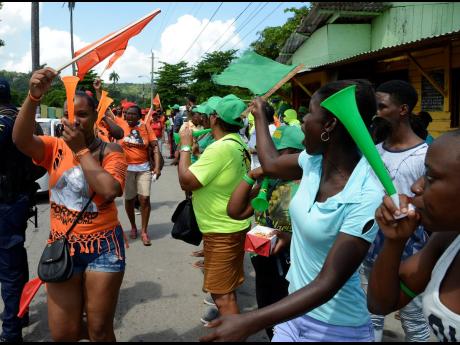Editorial | Liberating local gov’t
Cynics will perhaps mock Prime Minister Andrew Holness for admitting that the campaign for the municipal elections has heightened his awareness of how disconnected Jamaicans are from local government, and how little confidence they have in their elected municipal representatives.
This newspaper, however, prefers to look at the positive side of the PM’s acknowledgement: his promise to do something about it. Otherwise, it would make sense to just abolish the arrangement.
But while Mr Holness, as prime minister, can do much to help rejuvenate the system, the problems are as much politically induced institutional ones that require fixes at the party level, as they are about shortage of resources or issues that need national intervention.
Or, as The Gleaner put it recently, local government councillors tend to operate more like vassals of the members of parliament (MPs) of their parties in whose constituencies their electoral divisions are located, than as representatives of the communities they are supposed to serve. Largely, the parties choose the kind of candidates for local government elections with whom this subservience sits well.
It is not surprising, therefore, that the campaign for the February 26 poll is being run like that for a national parliamentary election. There is little attention to the mandates of the municipal corporations and the services they are supposed to provide.
Put another way, the Opposition People’s National Party is openly attempting to make this vote a referendum on the stewardship on Mr Holness’ nearly eight years in government, hoping that victory, or a very strong performance, in these polls will provide it with momentum for the general election due in a year and a half. On the other hand, Mr Holness’ Jamaica Labour Party (JLP) has been defending its record and announcing new projects and initiatives.
POWER RELATIONSHIP
This is happening against the backdrop of the 80 per cent of Jamaicans who say that the performance of municipal governments in the seven years since the elections were last held is, at best, average. For half of that amount, it was decidedly poor, or worse.
Only one in five Jamaicans (20 per cent) feel that the councils have performed good, or better. Four in 10 Jamaicans say the authorities are even worse than they used to be.
The biggest concern of residents (60 per cent) is the absence of their councillors. They are not present in their divisions.
Which, in a way, makes sense, given the power relationship between the constituency’s MP and the divisional councillor in Jamaica’s culture of politics of patronage.
In that respect, Pearnel Charles, the former long-standing JLP politician and trade unionist, got it partially right.
Mr Charles, who was once the local government minister, said: “You wonder whether or not there is any need for local government, because they have to turn to the member of parliament … . The fact is this: local government has never been given the amount of funds that they need to [cover] local issues.”
In the past, this newspaper would have been inclined to support Mr Charles. But the idea of subsidiarity, bringing decision-making closer to the people they directly affect, is a logical extension of democratic governance.
LIMITED INDEPENDENCE
Indeed, nearly nine years ago Jamaica sought, on its face, to give deeper expression to that ideal by anchoring local government in the island’s Constitution. While the local governance law, which frames the operation of municipal authorities, is relatively progressive, the councils have not been liberated by the central government and the parties to operate even within their limited independence.
They have not claimed their right. Ambitionless councils and municipal leaders have accepted their lot.
Which is where Mr Holness’ recent remarks while on the hustings in Portland is relevant. The campaign, he said, had helped him to a better understanding of the problems in local governance.
Said the prime minister: “We cannot keep local government in the way that it has been for the last few years. Councillors have an important role to play in the development of their community. Councillors must be present in their division. Councillors must know their people. Councillors must pay attention to the issues of their community.
“...We cannot ignore the fact of what has been said in the polls regarding how people feel about their local government.”
He believes that even with the system’s limited resources, “local government can be far more effective than it is now”.
For this to happen, two things are important: communities must know what it is that their corporations are empowered to do – where does subsidiarity begins and what it covers; second, internal reform of the parties must including lifting MPs’ thumbs off municipal councillors, so as to transform them from Lilliputians to genuine representatives and advocates of their communities.
It is not too late to pivot the current campaign on these issues. But whatever the outcome of next week’s vote, this must be the trajectory of the new councils. They must assume ownership of their obligations.

